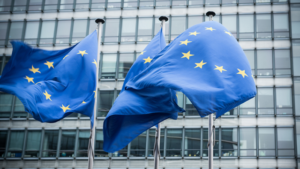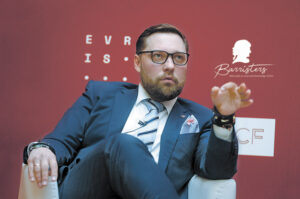
The National Association of Lobbyists of Ukraine (NALU) is initiating an official appeal to the European Parliament regarding the rules for registering Ukrainian organizations in the EU Transparency Register.
“The National Association of Lobbyists of Ukraine will soon send an official appeal to the European Parliament requesting clear and unambiguous clarification on which Ukrainian organizations are required to register in the European Union Transparency Register in order to interact with European institutions,” she told the Interfax-Ukraine news agency.
The association will also raise the question of whether Ukrainian entities—public organizations, professional associations, business associations, consulting companies, charitable foundations, and other structures—should undergo additional registration and obtain lobbyist status when working with EU bodies in accordance with the requirements of European legislation.
The association notes that with the entry into force of Ukraine’s Law on Lobbying and the state’s active course towards European integration, the issue of harmonizing Ukrainian lobbying practices with European Union approaches is becoming critically important. The lack of clear instructions and a unified position may create legal uncertainty for Ukrainian organizations seeking to operate within the EU legal framework and represent Ukraine’s interests at the international level.
“We seek to obtain an official explanation so that Ukrainian organizations can act in accordance with European rules, avoid risks, and ensure maximum transparency in their activities. This is also important for protecting Ukraine’s image as a state that is moving towards civilized interaction and open advocacy,” notes the NALU.
The explanations received from the European Parliament are planned to be published and forwarded to Ukrainian institutions, businesses, and public organizations as an official guideline for further work with EU bodies.

The National Association of Lobbyists of Ukraine (NALU) supports the European Parliament’s initiatives to establish a minimum age for access to social networks, video platforms, and digital AI services, as well as to ban the most harmful and addictive digital practices targeting minors.
“NALU fully supports this initiative of the European Parliament and considers it an important step towards creating a safe, ethical, and responsible digital environment,” said a statement from the NALU board, as reported by the Interfax-Ukraine agency.
NALU notes that the European recommendations provide, in particular, for setting the minimum age for access to social networks at 16, allowing children aged 13-16 to access social networks only with parental consent, banning the most harmful elements of digital design, including autoplay, infinite scroll, dark patterns, intrusive recommendation algorithms, a ban on targeted advertising and influencer marketing aimed at minors, as well as increased responsibility of digital platforms for the protection of children, including the personal responsibility of company executives and the implementation of technologies in them.
“In the context of Ukraine’s European integration and the adaptation of national regulations to EU standards, NALU officially supports the European Parliament’s proposals to reform digital safety rules for children. Ukrainian lobbyists in Brussels are already beginning consultations with European institutions to agree on approaches that can be implemented in Ukraine,” the statement said.
It is noted that the association will recommend that the Verkhovna Rada and relevant committees consider the possibility of adapting the proposed European standards to national legislation.
“NALU is ready to provide expert, analytical, and regulatory and methodological support to Ukrainian authorities in developing relevant legislative changes. The association believes that the protection of minors online is a matter of national security, digital health of society, and the state’s responsibility to the younger generation,” the document notes.
The association emphasized that NALU will continue to work on the adoption of transparent and European standards in the field of digital policy and advocacy, contributing to the formation of modern legislation that will protect children and support the development of an ethical digital space in Ukraine.
On November 26, 2025, the European Parliament adopted a report calling for the introduction of a unified minimum age of 16 in the European Union for access to social networks, video platforms, and digital AI services, as well as a ban on the most harmful and addictive digital practices targeting minors.

The first hundred lobbyists have registered in Ukraine’s Transparency Register, an open public platform that collects, processes, and publishes data on lobbying entities and their reports, according to a statement posted on the website of the National Agency for Corruption Prevention (NACP) on Thursday.
“As of November 13, 2025, 101 lobbying entities are registered in the Register, of which 51 are legal entities (on behalf of which 141 representatives can lobby) and 50 are individuals. Two people have terminated their status as lobbyists. So, in total, 191 lobbyists can influence decision-making in the country,” the statement said.
Among the legal entities registered in the Register, there are 27 companies (limited liability and joint-stock), 16 public associations (associations, unions), five law firms (associations, offices), and three others.
“The most popular areas of lobbying are: financial, banking, tax, and customs policy—76 lobbying entities; economic development, regulatory policy, and property—74 entities; legal policy—70 entities; law enforcement—68 entities; innovation and digital transformation – 66 entities; transport, communications, and infrastructure – 65 entities; environmental policy and natural resource use – 64 entities; agricultural and land policy – 63 entities; regional development and urban planning – 62 entities. The smallest number of entities chose the area of “Youth and Sports” – 36 lobbying entities,” the statement said.
The NACP reminds that lobbying entities must submit their first reports on their activities from the date of registration in the Register until December 31, 2025, to the Register between January 1 and January 30, 2026.
As reported, the Lobbyist Transparency Register, provided for by the law on lobbying, officially began operating in Ukraine on September 1. At the same time, the NACP put into commercial operation a key tool for its implementation – the Transparency Register.
Immediately after that, the National Association of Lobbyists (NALU) was created in Ukraine to promote investment and protect business interests. Today, it has offices in London and Zurich.
Source: https://nazk.gov.ua/uk/u-reestri-prozorosti-nazk-zareestruvalysya-pershi-100-lobistiv/

Invitation by the Organization for Economic Cooperation and Development (OECD) Working Group on combating bribery in Ukraine to join the Convention on Combating Bribery of Foreign Public Officials in International Business Transactions and become a full member of the relevant Working Group is recognition of the fact that Ukraine is clearly choosing a course of action to raise standards of transparency, accountability, and integrity in the interaction between business, civil society, and government.
This opinion was expressed to the Interfax-Ukraine agency by Oleksiy Shevchuk, chairman of the board of the National Association of Lobbyists of Ukraine.
“For us, as a professional community of lobbyists, the request from the Organization for Economic Cooperation and Development is an important signal: the state is clearly choosing a course of action to raise standards of transparency, accountability, and integrity in the interaction between business, civil society, and government,” he said.
Shevchuk noted that “in this context, the Association of Lobbyists of Ukraine believes that business, lobbyists, and state institutions should use this combination of two reforms—anti-corruption and lobbying—as an opportunity.”
According to Shevchuk, this refers, in particular, to the opportunity to create standards of professional ethics and conduct in the field of lobbying that will meet both the requirements of the law and the expectations of international partners, as well as the opportunity to review the internal policies of companies, “especially those operating abroad or in an international context, for compliance with the requirements of the Organization for Economic Cooperation and Development regarding the bribery of foreign officials.”
In addition, according to Shevchuk, such accession will “contribute to the new lobbying system becoming not only a platform for interests, but also a guarantor of good faith participation in state-building processes, creating trust in Ukraine among investors and international partners.”
“We believe that these changes should transform from a formal approach into an effective practical tool, and the Association is ready to facilitate training, code development, consultation, and monitoring. For Ukraine, this is a chance to increase competitiveness and demonstrate that we are capable of acting in accordance with the best international practices,” he said.
As reported, the Organization for Economic Cooperation and Development (OECD) Working Group on Bribery invited Ukraine to join the Convention on Combating Bribery of Foreign Public Officials in International Business Transactions and become a full member of the relevant Working Group. The basis for this process was draft law No. 11443, prepared by the parliamentary committee on law enforcement, on improving mechanisms for holding legal entities accountable for bribing foreign officials. In particular, the draft law provides for the possibility of applying special confiscation on the basis of a court decision to apply criminal law measures to a legal entity. According to the draft law, additional (non-financial) criminal law measures may be applied to a legal entity in the form of a temporary restriction on the activities of the legal entity or a temporary restriction on the acquisition of rights and/or benefits. The draft law also provides for an increase in the amount of fines imposed on legal entities as the main criminal law measure.